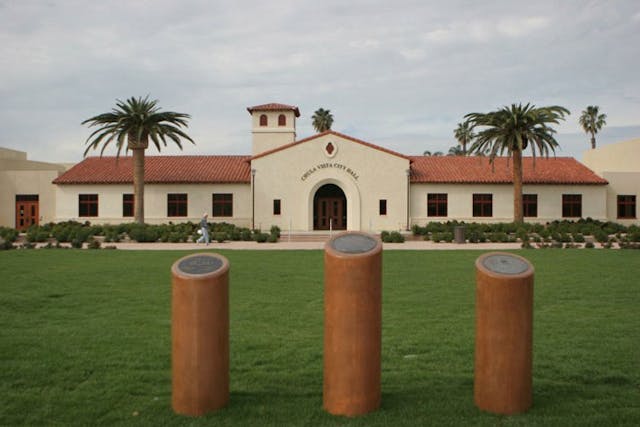Lalo Alcaraz: Cartoons and Cultura

Where many people might simply see a joke or a silly drawing, political cartoons offer a medium through which powerful ideas can be delivered to the world.
It is a medium in which San Diego-born artist, political commentator, and cultural consultant Lalo Alcaraz has specialized in for nearly 30 years.
“Images are powerful and convey a lot of information; they are everything,” Alcaraz said to La Prensa San Diego.
Alcaraz began drawing in his childhood, with early artwork taking the form of characters in cartoons, comic books, lucha libre wrestlers and cholos.
“I liked drawing everything,” he shared.
Alcaraz, says that his penchant for satire, a medium he recurs to for social commentary in his pieces, comes from his formative years.
“I really liked Mad Magazine and shows like ‘Dr. Demento,’ which would play goofy parodies of songs from the 60s and 70s,” he said. “I liked anything that made fun of stuff.”
His style and keen eye for identity-related topics was shaped by the things he observed growing up along the border.
Alcaraz remembers going back and forth across between Tijuana and San Diego in his youth. Being exposed to what it was like to be Mexican on the United States side and what it meant to be American on the Mexican side was a great influence on him and lead him to become interested in analyzing “pochismo,” or the concept of a Mexican identity in the U.S.
Alcaraz also credits meeting iconic artists in the Chicano movement at Balboa Park’s Centro Cultural de La Raza during a very conservative period in San Diego’s history in developing his artistic voice.
He shared that the work of Chicano artist David Avalos especially marked him.
“(David Avalos’) art was very in your face politically, but was not blunt in style; it was real smart stuff and I remember these bus ads that freaked everyone out that read ‘America’s Finest Tourist Plantation,’ showing an arrested Mexicano’s wrists in handcuffs and I said ‘wow’ when I saw it,” Alcaraz remembers.
As an undergrad, Alcaraz attended San Diego State University, where he double majored in art and environmental design. During this time, he became involved with MEChA and also found an outlet for his political views in The Daily Aztec, SDSU’s student publication.
“I had discovered political cartoons and began doing them for the school paper,” Alcaraz shared. “It was interesting to have like a community of students that loved to see my name and cartoons in the paper.”
However, feedback wasn’t always positive, and Alcaraz remembers getting hate mail from people on campus who opposed the views expressed in his cartoons. The negative feedback, he says, helped confirm his non-conservative beliefs about the ways politics and society work.
Alcaraz earned his bachelor’s degree in 1987 and left off for the University of California, Berkeley to work on a masters degree in architecture.
During his postgrad years, Alcaraz came up with the idea for the main characters and concept for “La Cucaracha,” which in 2002 would become the first Latino nationally-syndicated political comic strip to feature in major newspapers across the U.S. He also began Pocho Magazine, a satirical publication which which brought a Latino-in -America perspective though humor.
In the early ‘90s, Alcaraz became a weekly contributor to the LA Weekly. He remembers the social and political environment at the time displayed strong anti-immigrant tendencies, leading him to use his weekly cartoon to compliment his activism.
“I was with lots of groups doing marches and activism and had to draw a cartoon every week, but I felt that it was part of my activism to make (the weekly cartoon) relevant to the community,” Alcaraz said.
Alcaraz attacked issues such as Proposition 187, which banned undocumented immigrants from using non-emergency State resources, and politicians supporting such measures, like then Governor of California Pete Wilson.
In the months leading up to Wilson’s reelection, it was reported that Disney had donated money to Wilson’s campaign. Alcaraz, who had noticed that Disney had begun marketing to Latinos at the time, thought the move was conflicting.
“It came out that Disney had given money to Pete Wilson, and to be fair they gave money to his opponent also, but I thought it was ironic that Disney was starting to market its movies to Latinos but supported Wilson,” Alcaraz stated.
This dissonance lead Alcaraz to draw “Migra Mouse,” a parody of Mickey Mouse dressed up as a Border Patrol agent. A caption at the bottom of the piece reads “Disney Co. $upport$ Wilson” (sic). The cartoon became a standard of arms among activist circles immediately.
“’Migra Mouse’ went viral before the internet,” Alcaraz said. “People were xeroxing it, printing it, blowing it up, drawing their own versions, and taking it to rallies and marches and it was pretty cool to see that.”
That wasn’t the only time the world’s largest entertainment company was a target of Alcaraz and his pen. In 2013, when Disney filed a patent on the term “Dia de los Muertos” for a film, which would be 2017’s “Coco,” Alcaraz drew “Muerto Mouse,” a caricature in which a Godzilla-sized Mickey Mouse wreaked havoc on a city. A caption at the top of the cartoon read “It’s Coming to Trademark your Cultura!”
The cartoon set off a series of events through which Alcaraz’s friend, Marcela Davison Aviles, who was already a Disney consultant for a TV show, brought him on board to work on “Coco” as a cultural consultant.
While working on the film, Alcaraz supervised aspects of the script and Spanish-language verbiage. Although he did have some reservations about working with Disney, he was surprised to find out that the film being made was an honestly conscious project.
“Coco” turned out to be a tremendous hit, netting both commercial and critical success, earning two academy awards and becoming one of the highest-grossing animated films of all time.
Currently, Alcaraz’s continues to draw political cartoons and is working on a couple of books along with Barrio Logan-based artist Junco Canché.






